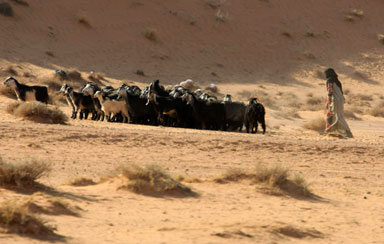By Andrew England in Abu Dhabi
The project began on a small scale, with two wells dug into the ground a short distance from the Nile as the river snakes a path through remote northern Sudan.
Tests on the underground water quality and the soil proved positive and a small batch of wheat was harvested last year, confirming that the land was suitable for cereal and forage crops.
The results mean Hail Agricultural Development, a Saudi Arabian agricultural company, will move ahead to the next stage of a 22,000-acre project in Africa’s largest country. For the oil-rich Gulf kingdom the move means that it is a small step closer towards its longer-term strategic goal of securing food resources through large-scale farm projects overseas.
Since details emerged of Saudi Arabia’s plans to ensure supplies of wheat, rice, corn, soya beans and alfalfa through overseas agricultural investments, officials have insisted that they intended the programme to be private-sector led.
The government’s role will be to secure bilateral agreements with nations hosting the farms, including details of how much would be exported back to the kingdom. It will also provide financial support through development institutions and last month announced the setting up of an $800m company to invest in joint ventures and assist with infrastructure development.
But it is the kingdom’s private sector – which has helped the desert nation be wheat self-sufficient for the past three decades – that is expected to be the player getting its hands dirty on the ground.
Hadco will carry out a pilot project for corn next month, and it hopes to be producing about 6,000 acres of wheat in Sudan in 2010, with a 48-year-lease on the land for an annual fee of about SD£3 ($1.30, €0.90, £0.80) per feddan (1.04 acres, 0.42 hectares).
“It’s the first country that gives us land without complicated procedures,” said Mohammed Rasheed al-Balawi, Hadco’s agriculture general manager. “The area is big, the people are friendly [and] they gave us the land almost free.”
Hadco, which secured a SR100m ($27m, €19m, £17m) soft loan from a Saudi development institution, expects to invest SR170m in the project.
The company’s ultimate target is to farm 100,000 hectares – nearly three times the land it cultivates in its home country – which will include investments in other, more distant countries such as Turkey and Kazakhstan. With those nations, however, it will wait until the government has secured bilateral agreements as the authorities work on a list of some 20 countries they will recommend to the private sector.
“We have good experience on large-scale farming so we said to the government that we can, as the private sector, secure your needs from your major imported crops 100 per cent,” Mr Balawi said. “Give us support, politically and financially, but we can do it.”
The initiative comes as Saudi companies, such as Hadco, face challenges at home following the government’s decision to phase out its domestic wheat programme by 2016 to protect its finite water resources, with annual 12.5 per cent reductions in production.
Mr Balawi said it was a problem because “some of these areas, they depend on the agriculture business” but added that Hadco may look to produce more wheat overseas than it has at home.
Hadco, which has been in the business for almost 27 years and produces about 60,000 tons of wheat annually in the kingdom, is not the only one to harbour such ambitions.
Several firms have joined forces to form a limited liability company, Jannat, which will seek to buy companies, enter into joint ventures and set up greenfield projects – all overseas. It has a target of securing 100,000 to 215,000 hectares of land to grow wheat, rice, vegetables and fodder, said Saad Al Swatt, chief executive of Tabuk Agricultural Development Company, one of Jannat’s main investors.
Jannat has plans to invest $40m in African countries, and Tadco, Jannat and its other partners signed a memorandum of understanding with the Arab Authority for Agricultural Investment and Development to set up an agricultural company to invest abroad, according to a statement on the Saudi stock market on Saturday.
The AAAID was set up by Arab governments during the 1970s oil boom to contribute to Arab food security.
The companies are moving ahead with plans in spite of some analysts questioning the risks of the programme and whether Saudi companies have the experience and appetite to invest abroad.
Particular concerns have been raised about the prospect of an Arab country shipping food from impoverished African states that suffer perennial food shortages, while also dealing with the sensitivities that surround land ownership.
Hadco has insured its project for up to 90 per cent of its investment through a pan-Arab, government-owned insurance company. The agricultural group hopes to offer Sudan employment and development through the project, with an estimate that it will create at least 500 jobs.
“The area where we are is almost an underdeveloped area so it will be a great chance for them to develop the area and have a lot of job opportunities,” Mr Balawi said “I think the Saudi government will look to it like a win-win situation. Of course we will not export all our production to Saudi Arabia.”











